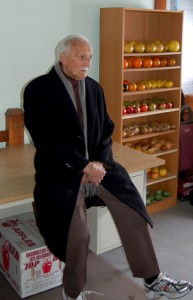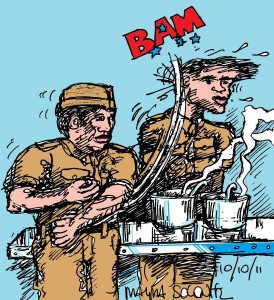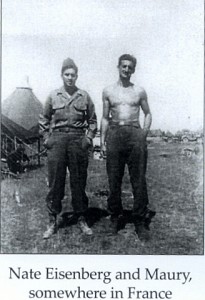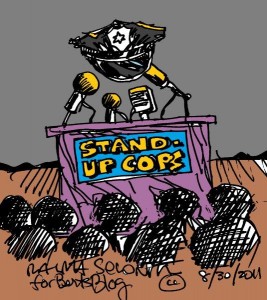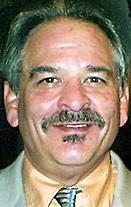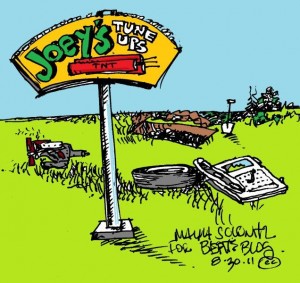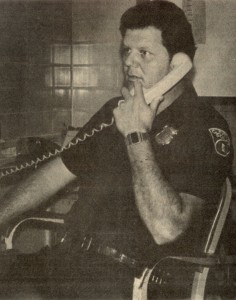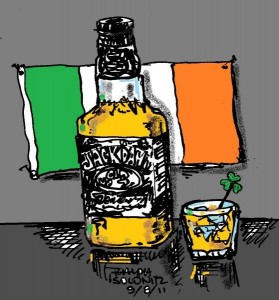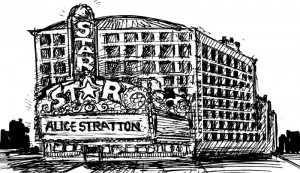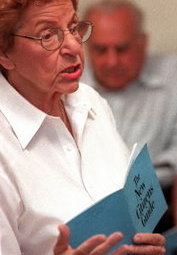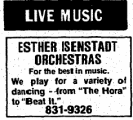Category — Cleveland, Full
CHIVES AND WWII
The title of Maury Feren’s autobiography is almost book-length: Wheeling & Dealing In My World, Including World War II Memories, by Maury Feren, Cleveland, Ohio’s Produce King.
Lettuce and tomatoes aren’t that compelling to me, but World War II is, so I read the book.
Maury fought the war on two fronts: 1.) Europe and 2.) Europe — against his fellow American soldiers.
Here are some chapter titles: “Another Bigot,” “I’ll Show You What a Dirty Jew Can Do,” “Anti-Semitism at Home and Abroad” and “More Anti-Semitism.”
An American soldier called Maury a “rag peddler.” Maury “gave him a lesson in boxing that he might never forget.”
A mess hall server said to Maury, “Vot vould you lick? A piss of this, and a piss of that?”
Maury grabbed him by the throat. “If you ever talk like that again to me, I’ll close your windpipe so you’ll never be able to talk again.”
Maury encountered German soldiers and civilians in Essen, Germany. “I screamed at them in a Yiddish-kind-of-German about how despicable they were . . . ‘You are murders, baby killers, women killers . . . I am a Jew. Look at me and see whether you want to kill me too.’”
Maybe I’ll read Maury’s chapter on chives.
Probably not. Is there any ass-kicking in chives?
—-
Footnote: Maury, 96, is still kickin’. Biz a hundert un tsvantsik, Maury. (You should live to 120, Maury.)
—-
Jack Stratton, Yiddishe Cup’s alternate drummer, as Mushy Krongold:
December 7, 2011 3 Comments
COPS ARE FUNNY
Cleveland cop Tommy Alusheff moonlighted as a comedian, using the stage name Morey Cohen — a conflation of Morey Amsterdam and Myron Cohen (two of Alusheff’s favorite comedians). Morey Cohen worked at Hilarities and other regional comedy clubs, plus he did some out-of-town gigs, like in Los Angeles.
Morey Cohen’s father, Chris Alusheff, owned the Baker Candy factory in Collinwood. Chris Alusheff once told me Jews like dark chocolate more than gentiles like it. Why? Kashrut? (Kosher dietary laws?) Probably. The Alusheffs were Macedonians. Their best-selling product was chocolate-covered whipped candy eggs, sold at Easter time.
Morey Cohen died last year. I didn’t go to the funeral; I only knew him by reputation. Morey wasn’t in the Sixth District, which had been my police beat. (I was a reporter in the 1980s.)
The top comedy cop at the Sixth District had been Paul Falzone, a stand-up guy, but not a stand-up comedian. Falzone was almost ready for prime time. I hung out with Falzone in the burglary unit at the East 152nd Street station, aka The District, the cop shop. The building had few windows. It was a fortress, built after the 1967 Hough riots. When the A/C went out in the building, it was a real sweat shop. Falzone said, “I have eight minutes of material to Morey’s twelve.”
Falzone asked me, “How are the Jewish holidays treating you?” It was September.
“Fine.”
“You’ve got to watch for neo-Nazis,” he said.
“Why?”
“Everyone has to watch for somebody. Italians, they got to watch out for other Italians; you start your car and it goes ba-boom instead of vroom. The Irish, they got to watch for Jack Daniels. Hey, how can you tell Ronald McDonald at a nudist colony?”
“How?”
“He’s the one with sesame seed buns.”
Falzone ran for county sheriff, and president of the patrolmen’s union. He didn’t win either. He eventually became police chief of Bratenahl, a suburb. Now he’s running for mayor of Bratenahl.
Two years ago Cuyahoga County tried to put Falzone in jail for theft. Something about drugs and guns missing from the Bratenahl property room.
Falzone was acquitted. Now he’s suing Bratenahl for “humiliation.” Doesn’t sound funny, but Falzone can probably get some jokes out of it. Bad jokes. He needs only four more minutes to match Morey Cohen . . .
“So I’m on patrol, and I walk into the Viking bar. I see a 16-year-old punk with a Miller’s. I say, “When’s your birthday, kid?”
He says, “October 10.”
“What year?”
“Every year.”
—
Footnote: The Sixth District became the Fifth District in 2008, when the Cleveland Police Department reapportioned the districts.
—
From illustrator Ralph Solonitz’s Parade of Nations collection:
September 28, 2011 5 Comments
HOLLYWOOD BOWLS US
My wife, Alice, was one of the many star-struck fans who drove to Rockside Road and I-77 in Cleveland to audition for The Avengers movie.
I asked Alice, “Did you get the part? Did you read anything?”
Not only did she not read, she did not even audition. The traffic was so horrendous at Rockside Road, she turned around. Thousands of people had shown up for the audition. The line of wannabes snaked at least a mile from the building, according to the Cleveland Plain Dealer.
There was another Hollywood movie, Fun Size, filmed a few weeks earlier, several blocks from our house in Cleveland Heights. That’s when Alice got star struck. Catering and make-up trucks were around our neighborhood.
I heard about it. I didn’t want to see the trucks. I have a bias against Hollywood.
Hollywood guys have too much fun. They should be making radiator valves, or PVC pipe fittings, like the rest of the world. Not blowing things up and eating from catering trucks.
My wife’s school gym (where she teaches elementary-school physical education) was turned into a vast make-up room for Fun Size. She said the school board got $500,000 for the rental.
I didn’t believe that. Alice’s source — the school janitor — told her the five-hundred grand figure.
Make that $50,000. I’d accept that. Better yet, $5,000. Who would pay half a million to rent a school building for a couple days? Hollywood is a funny ballpark, but not that funny.
Hollywood’s latest tax-abatement haven/heaven is Ohio. Used to be Michigan.
I would like to be in a movie, Alice. But I would demand some lines and star food. No way am I going to be a man in the crowd, not at this point in my career.
I want to blow up something. Grab a lighter, Alice. You have a role.
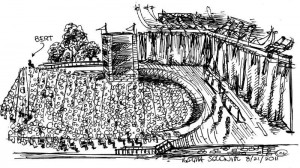
Those Lips, Those Eyes, United Artists, 1980, Cain Park amphitheater, Cleveland Heights. Bert Stratton at far left.
—-
A version of this story is crossposted today at CoolCleveland.com.
August 31, 2011 4 Comments
HE MADE A LIVING AT MUSIC
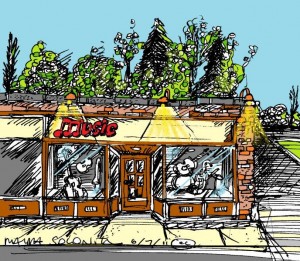
Barry Weinberg, the owner of Mayfield Music in Cleveland Heights, rented PA systems and sold amps, guitars and drums. He died at 55. He was a rocker who lived hard. The sign at the back of his store read Give Me the Dough and You Can Go.
He carried a quality line of blues harps.
Before Barry, Mayfield Music was Chick Chaikin’s store. Chick lived pretty hard too, but in a middle-class way: Chick golfed, raised a family and played thousands of cocktail-piano gigs.
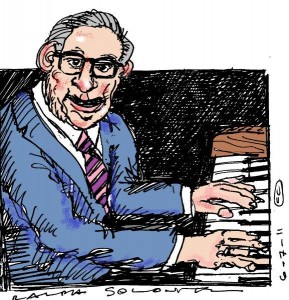
Chick Chaikin
Chick was a big-band leader and solo pianist for decades. He played six nights a week at the Colony Restaurant, and knew just about every pop song written, according to trumpeter Bob Dreifort, who I talked to recently.
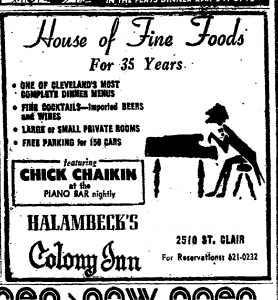
Cleveland Plain Dealer, 8/23/74
Chick’s brother Bill went out to Hollywood and eventually ran a movie studio, Avco Embassy. Bill was involved in The Graduate and more.
“I could have gone to the Coast too,” Chick said. “But my life is here, and I have my work, although every winter I say this is it. But I’m still here.” (Plain Dealer interview, 1977)
Chick’s store was Currier-Chaikin Music. Chick’s business partner, John Currier, was even older than Chick. John Currier had played piano at Euclid Beach Park in the 1920s.
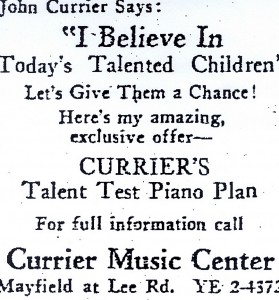
Cleveland Plain Dealer 1/23/53
Chick called me “Toby’s son.” Chick didn’t know my name. Chick and my father, Toby, were Kinsman Road boys.
Most of my father’s friends and acquaintances were businessmen: shoe store owners, insurance men, pawn shop owners.
How did my dad know a full-time musician? I guess Toby had no choice. Toby and Chick grew up almost next door to each other.
How did Chick wind up a full-time musician? I didn’t ask old people questions like that when I was in my twenties.
Chick’s life was all about family and music, his daughter, Jeri, told me this year. For a while Chick had a side job giving private music lessons through Cleveland public schools.I didn’t have the chutzpah to ask Jeri if there was more to Chick’s headstone than Leonard ‘Chick’ Chaikin 1915-2000.
Here are three fitting epitaphs:
a) “Here lies a man who made a living at music.”
b) “Chick a la King.”
c) “I’m here 7 nights a week.”
July 6, 2011 10 Comments
OLD JEWISH MONEY
AT DRUG MART
Drug Mart is a dollar store/drugstore on Cleveland’s West Side. I buy shampoo and cough drops there. Also, shoehorns, Gorilla tape and off-brand Cheerios (formerly Tasteeos, now Toasted Oats).
Drug Mart sells the Wall Street Journal and the New York Times, but I never see anybody buy the papers except for an elderly man in a suit and tie.
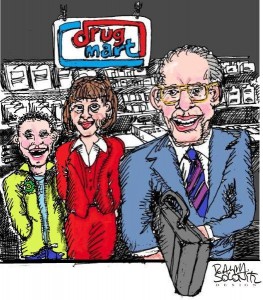
What is this guy doing on the West Side?
I stood in back of him in line, and had time to kill. I said, “I wouldn’t normally bring this up — like if we were on the East Side [where the Yidn live] — but you look like my uncle. You have to be a landsman.” [Paisan]
He smiled and said, “I’m Charlie Lichtman. And what are you doing here?”
“I own property here.”
“Houses?”
“Buildings, like the old Armed Forces Recruiters building.” Which was two blocks away.
Charlie said, “I live in the new Armed Forces building.” The fancy condos — with recruiting offices underneath — across the street from my building.
“You aren’t from around here?” I said.
“I’m from New York,” he said, handing me a card: Charles M. Lichtman Jr., attorney at law, Cleveland and
New York.
“I had an article in the New York Times yesterday,” I said. I was just waiting for somebody — anybody — to say “New York,” or “times” or “new.”
“I read the article,” Charlie said.
I Googled Charlie when I got home. He had graduated from Harvard University and Harvard Law School, and so had his father (Harvard ’14, Harvard Law ’16). His father had been the president of the Harvard Menorah Society (a precursor to Hillel) in 1915.
Charlie was apparently old German Jewish money (“Our Crowd” division, NYC). And he was at the Drug Mart on the West Side of Cleveland.
Why?
An attractive woman stood next to him. “That’s why I’m here,” Charlie said, pointing to her.
—
“Charles M. Lichtman Jr.” is a pseudonym.
—
Enjoy the “Klezmer Guy” blog, with w/ beer, food
and music . . .
Nighttown
Tues. June 14
7:30 p.m.
$10
Spoken word, klezmer, rock, pop, Tin Pan Alley and alley.
Bert Stratton, clarinet, spoken word
Alan Douglass, piano, vocals
Jack Stratton, drums, beat-box
Lots of new material in this show. Your name might pop up in the script.
Nighttown
12387 Cedar Rd., Cleveland Hts.
216-795-0550
www.nighttowncleveland.com
—
Yiddishe Cup — the whole band — is at Parade The Circle, Cleveland, 11 a.m. Sat., June 11. We’re playing a pre-parade concert.
We’ll also be at Temple Israel (Akron, Ohio) that night (June 11), 8 p.m., for a concert. 330-762-8617.
June 1, 2011 4 Comments
THE ESTHER ISENSTADT ORCHESTRAS
Bass player Esther Isenstadt ran classified ads in the back of the Cleveland Jewish News in the 1970s and 1980s: “Sophisticated music for discriminating people” . . . “Leave your records at home and bring LIFE to your party” . . . “From ‘The Hora’ to ‘Beat It.'”
Esther was gigging regularly when Yiddishe Cup started in 1988. I didn’t run into her. She was working the senior-adult circuit, while Yiddishe Cup was doing the glam jobs: bar mitzvahs and weddings. Esther was not a klezmer musician. She played mostly classical and pop — and some Jewish.
When I eventually met Esther, she was in The Weils assisted living facility. She was 86 (2003). She approached me after a Yiddishe Cup senior-adult program to say hello. I told her I knew of her. She smiled. I had one of her songbooks; I said I bought it used at the Cleveland Music School Settlement. She smiled again. Then she didn’t smile. She said, “I never thought I’d end up here!”
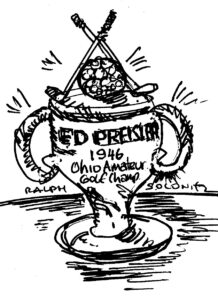 Ed Preisler — another Weils resident — chimed in, “I came out here to die.” (Ed died six months later.) Ed was the 1946 Ohio Amateur Golf Champion.
Ed Preisler — another Weils resident — chimed in, “I came out here to die.” (Ed died six months later.) Ed was the 1946 Ohio Amateur Golf Champion.
Ted Bonda, the former owner of the Cleveland Indians, was also there. I switched gears; I asked Ted, Ed and Esther — and the other people schmoozing after the program — if they knew Mickey Katz. One resident knew Mickey from Yale Avenue, Cleveland; another, from Berkshire Road, Cleveland Heights.
I asked the group if they were familiar with the word kile (hernia). Nobody knew it. That was surprising. Kile is the punch line in Mickey Katz’s song “16 Tons [of Hard Salami]” . . . “The balebus (boss) promised me a real gedile (glory), instead of geldile I catched me a kile (hernia).” The Weils was apparently not heavy-duty Yiddishists.
Esther Isendstadt had played in four suburban orchestras, raised a family, taught elementary school, led party bands and taught ESL in “retirement.” She was a Glenville High graduate, as were Bonda and Preisler. Glenville High was where Jewish overachievers went to high school in the 1930s. [John Adams High students — like my parents — would have disagreed with that. John Adams, in the Kinsman neighborhood, was more proste (working-class) than Glenville, but equally proud.]
I learned “Shir Lashalom” (A Song of Peace) from Esther’s book. That tune was a must-play in 1995 — the year Yitzhak Rabin was assassinated. The lyrics were in Rabin’s pocket when he got shot.
Esther had rubber-stamped Esther Isenstadt Orchestras on every other page of the used song book. A Jewish bandleader with a rubber stamp.
I got a rubber stamp.
Esther died last month at 93.
There weren’t many bands with names like the Esther Isenstadt Orchestra in the 1970s. There still aren’t.
—-
Illustration by Ralph Solonitz.
November 19, 2010 5 Comments
SHOUSE
If you’re on the Cleveland Workmen’s Circle concert committee, there’s a 25 percent chance you’ll be dead in 10 years. (I counted the dead from a 10-year-old committee roster.)
An elderly woman suggested we include a tribute to a recently deceased committee member in our concert brochure. But the brochure’s cover already read “in memory of Eugenia and Henry Green,” the concert’s principal funders.
I said, “People are dying on this committee every other year. We can’t be putting in written testimonials.”
“Like who? Who’s dying?” the woman asked.
I didn’t name names. Why sidetrack the meeting?
The committee met in a room under a portrait of Eugene V. Debs. A photo of Norman Thomas was in the hallway.
This committee in its prime — about 20 years ago — was like hanging around the cafeteria at CCNY or Western Reserve University in the day. There had been Max Wohl, Socialist (capital S) and major ACLU donor; David Guralnik, editor of the New World Dictionary; Herman Hellerstein, the cardiologist who first recommended, in the 1960s, exercise after heart attacks; and Harold Ticktin, Mississippi civil rights lawyer (summer 1965), authority on the Jewish Bund, and former “Kinsman cowboy” (Kinsman Road loiterer). Ticktin said the Jewish Kinsman cowboys in the 1930s called the Italian Kinsman cowboys “noodles” and shkutzim (gentile boys).
Committee members occasionally called each other “friend,” a quasi-socialist salutation.
Several “friends” decided to honor Yiddishe Cup with a Workmen’s Circle dinner. What Yiddishe Cup didn’t know: the honoree paid to be honored.
Ben Shouse, friend in charge of fundraising, had a booming voice and a shock of gray hair like H.L. Mencken. And he wore suits like Mencken, and he smoked a cigar like Mencken. Politically, Shouse was un-Menckenable. Shouse was a retired labor union boss, autodidact (he liked inculcate), and an advocate for the arts, especially “Shakespeare for the workers”-type events.
Shouse phoned me, suggesting Yiddishe Cup musicians pony up for the banquet. He said, “Stratton, you know how these things work. Cooperate!”
I didn’t know how these things worked. Not in 1994, I didn’t. I thought Yiddishe Cup was being honored because we were good — some sort of arts prize. I had played tribute dinners before, but had never understood the dynamics. Shouse said he had raised thousands at a previous dinner in honor of his elderly girlfriend.
Two Yiddishe Cup musicians told me they couldn’t afford the price of the dinner, let alone bring friends, or crazier yet, “buy a table.”
I corralled three people, including my wife, to attend. I hesitated to hock friends, particularly for a chicken dinner at a windowless Alpha Drive party center. And my friends would have to listen to speeches about a fraternal organization, Workmen’s Circle, most had never heard of.
Shouse phoned Yiddishe Cup’s singer and said to him: “Stratton gave fifty-five dollars. Greenman gave twenty-five dollars. How about you? And who are you bringing?”
Shouse nearly traumatized my singer, a sensitive artist.
One Yiddishe Cup musician didn’t bother to show up for the tribute. Another musician rewound his Shouse phone message for me: “This dinner is in your fucking honor! You’re sophisticated. You know the rules. Do your part!”
Shouse died in 2003. He raised a lot of money for the arts in Cleveland.
—
Coda:
This year the concert committee added several younger members. Odds are now probably less than 25 percent of a random-selected committee member dying in the next 10 years. Also, the Eugene V. Debs and Norman Thomas pictures are down. Rebbe Menachem Schneerson is up. A Chabad-affiliate organization bought the Workmen’s Circle building and shares it with the Workmen’s Circle. Now playing in Cleveland: Enemies: A Love Story.
May 26, 2010 6 Comments
FOR WHOM THE T-BELL TOLLS
While waiting in line at Taco Bell, I tried to unlock the mystery of the restaurant’s warning: “Time Delay/Time-Lock” safe can not be opened for 10 minutes and up to 18 hours.
I couldn’t unlock it.
The other drawback — and a big one — to my West Side T-Bell hangout was the manager locked the restrooms because of vandalism. I had to ask for a key. The manager lost some of my business because of that. Please, can I go? I didn’t like repeating first grade.
I was at Taco Bell when the founder, Glen Bell Jr., died. I hadn’t known a Mr. Bell existed until I read his obit. A customer broke the news to me — not about Bell’s death — but about the manager not locking the restroom door anymore. In memory of Glen Bell Jr.? In the obit, Bell said customer service was paramount.
Hallelujah for the new open door policy, Brother Bell.
The customer in front of me said, “They finally got smart here. People come in here after hours on the road, and they have to go!”
I frequented T-Bell more often because of the new restroom policy. And I developed a new T-Bell hang-up — a musical one. I asked the young cashier to name the horrible song playing. She couldn’t. Name the artist? “It’s satellite,” she said.
Put cilantro on that satellite radio station, hon. Quash the piped-in Lady Gaga music. The customer comes first.
—
2 of 2 posts for 4/21/10
April 21, 2010 4 Comments
GORDONS PARKED
When I was growing up, saying “Jewish music” was like “Jewish cars.” Didn’t mean a thing.
On second thought, “Jewish cars” did mean something. It meant, for example, the Boat — an Olds 98 owned by my friend Mark’s father. The Boat had electric windows and was oceanic. (Mark was richer than the rest of us, I think. He lived by Cedar and Green roads, and his doorbell lit up.)
Years later, a West Side gentile called those humongous Detroit rides “Jew boats.” So maybe there were Jewish cars.
Re: Jewish music . . .
I learned about that at the house of another high school friend, Shelly Gordon. His parents knew Israeli and Yiddish music, cold. Shelly was rarely home. I was an adult when I got interested in Jewish music, and Shelly had already moved to Israel. (His parents were such impassioned Zionists most of the family wound up in Israel.)
Shelly’s parents were Labor Zionists (Poale Zion). They seemed to know every classic Israeli tune and how to dance and/or sing it. And the Gordon family attended a Yiddish camp in Michigan. (Farband/Jewish National Workers Alliance.)
The parents didn’t know sports, which was odd because Shelly turned into a star athlete. He played tennis for Ohio State and became a tennis pro in Israel. Shelly did that for more than 30 years. (Still at it.) He never took a private tennis lesson.
Shelly didn’t care about Jewish music; he cared about the Browns, Buckeyes and Indians. In Israel he logs on — to this day — at about 3 a.m. to catch Cleveland sports scores on the Internet. He has a yarmulke that reads “Cleveland Cavaliers.”
When I went to Jerusalem in 2006, I played The Wall. Shelly. At the Israel Tennis Center, Shelly was like Moshiach (Messiah); he had the highest seniority and everybody deferred to him. He had even beaten Andy Ram, a Wimbledon doubles champion. “Andy was 12 at the time,” Shelly pointed out.
Shelly’s dad, Sanford (the man who knew all the Hebrew tunes), never played tennis. In fact Mr. Gordon was so oblivious to sports he didn’t even sign Shelly up for Little League. Mr. Gordon was not an immigrant or DP (Displaced Person); he was a NASA scientist and full-time Zionist. Baseball meant nothing to Israelis, thus, it meant nothing to Mr. Gordon.
Shelly went to a Zionist camp in Michigan. (Habonim Camp/The Builders.)
On the flipside: My parents played tennis; didn’t collect Jewish song books; didn’t send me to any kind of camp; and my dad managed a Little League team. So I wound up playing klezmer music.
When Mrs. Gordon died last month, her body was flown from Israel to Cleveland, to Mt. Olive Cemetery. A twist on shipping an American Jewish corpse to Mt. Olive, Jerusalem. Mrs. Gordon wanted to be buried next to her late husband.
At Mrs. Gordon’s funeral, I had time to kill because the mourners, following Orthodox tradition, shoveled mounds and mounds of dirt into the grave. Took a half hour. I noticed Mr. Gordon’s tombstone said on the back side: “A kind and gentle man loved by all.” In his case, true.
Mr. Gordon was eydl (polite/refined). Also, a rocket scientist and excellent balloon twister. His wife, Beatrice, had gone to college and social work school after raising children. She wasn’t idle.
When my kids were little, I took them to the Gordons often. (The Gordon grandchildren were in Israel. That worked out well for my family.) I called Mr. and Mrs. Gordon “Beasan” behind their backs. It was a contraction of Beatrice and Sanford, as in: “Let’s go to Beasan’s for pizza and some magic tricks.”
What a pair.
—-
1 of 2 posts for 11/11/09. Please see the post below too.
November 11, 2009 2 Comments
FISHY
1. JEWISH FORK-LORE
Musician Mickey Katz called chocolate phosphates “Jew beers.” He drank them at Solomon’s on E. 105th Street.
I drank mine at Solomon’s at the Cedar Center shopping strip, where Solomon’s moved to.
For some Semitic semantic reason, goys occasionally called Cedar Center the Gaza Strip. Now it kind of is. The north side of Cedar Center is concrete chunks and gravel heaps. A real estate developer knocked down the 1950s-era plaza and plans to redevelop. Who knows when.
Solomon’s was my family’s deli of choice. My father, Toby, was a “deli Jew.” In the Jewish world, that’s usually a putdown, meaning the person knows more about corned beef than Rashi. Toby’s favorite food was a “good piece of rye bread.”
Toby, a phosphate fan, probably didn’t drink more than a dozen real beers his whole life. He should have. In his retirement, when he drank booze he smiled a lot more. A bit shiker at one party, Toby teed off on a watermelon fruit bowl with a golf club. That stuck with me. [Shiker is drunk.]
Toby grew up in a deli. His mother had a candy store/ deli at E. 118 Street and Kinsman Road. She sold it to her half-brother when he came over from the Old Country. Something fishy about that deal — something involving the half-brother’s wife. My grandmother went from candy store/deli owner to simply candy store owner. Not a lateral move.
At the Gaza Strip, there was also Corky & Lenny’s. (Still around — four miles east.) A couple small Jews hung out in the rear booth at Corky’s. One was Harvey, who did collections for a major landlord. (Major, to me, means more than 1,000 units.) I knew Harvey from junior high.
He sued my mother. My mother, for health reasons, moved from her Beachwood apartment after 27 years into an assisted living facility. She had a couple months left on her lease. Harvey, who represented the major landlord, went after her. Harvey’s boss, by the way, loved my band. So what. My mother was collectable.
Freelance journalist David Sax just wrotea book about the decline of delis. Here’s something for the second edition, David: Delis went downhill when they added TVs. Now you have to watch the Browns while you eat.
I was deli-famous. At Jack’s Delion Green Road, I had a thank-you note up in the entrance. My letter was about the terrific tray for my firstborn’s bris. Fatherhood was about buying huge quantities of smoked fish. What a blast. (I ordered the exact same tray for my daughter’s naming.)
I complimented Jack’s Deli on its fish, which my Aunt Bernice, The Maven, also liked. I mentioned “The Maven’s seal of approval” in my letter. Bernice work for a food broker and knew food.
My letter was up for a couple years.
—
(Acknowledgment to Henry Sapoznik for “fork-lore” in this story’s title.)
***
2. ’DINES
The trend at mass-feed kiddushes (post-service temple chows) is toward Israeli foods: hummus, baba ganoush, Israeli salad.
When you privatize — and don’t invite the whole congregation — you typically add some fish.
All Jews like a good piece of fish: lox, smoked fish, herring, the occasional sardine.
My youngest son recently called from Trader Joe’s in Ann Arbor, Mich., and said, “Don’t get excited, Dad, but do I want the sardines in oil or water?”
“Oil.”
I did get excited. My college kid was finally getting into ’dines.
My mother had given me about eight cans of ’dines when I went off to college. I ate them on Sunday evenings, when the dorm cafeteria was closed. (This was back when sardine cans opened with a key, and the ’dines were Portuguese — not Moroccan like now.) Surprisingly – to me at least – the guys in the dorm wouldn’t share my ’dines. Pizza time.
I liked all kinds of ’dines. Even the monster-size sardines in tomato sauce were OK. Bones, no bones . . . no matter. Cajun sauce, soya oil, olive oil, mustard sauce . . . all good. Four ’dines in a can, two in a can . . . either way.
Anchovies? Also, an excellent choice. Make sure you buy your anchovies in a bottle; they last longer than in cans.
Herring in wine sauce. Beware. Last month Heinen’s supermarket substituted Vita brand for Golden Herring. That was lamentable. Vita is too sugary.
At luncheons, the other Yiddishe Cup musicians don’t seem to appreciate the fish (i.e., the “dairy spread” in kosher parlance) as much as I do. Yes, they like the lox. Lox is apple pie. But the other items (smoked fish excluded) get little play from the band. You should see the mountains of herring left over.
October 21, 2009 17 Comments

